
.webp)
.webp)
.webp)
.webp)
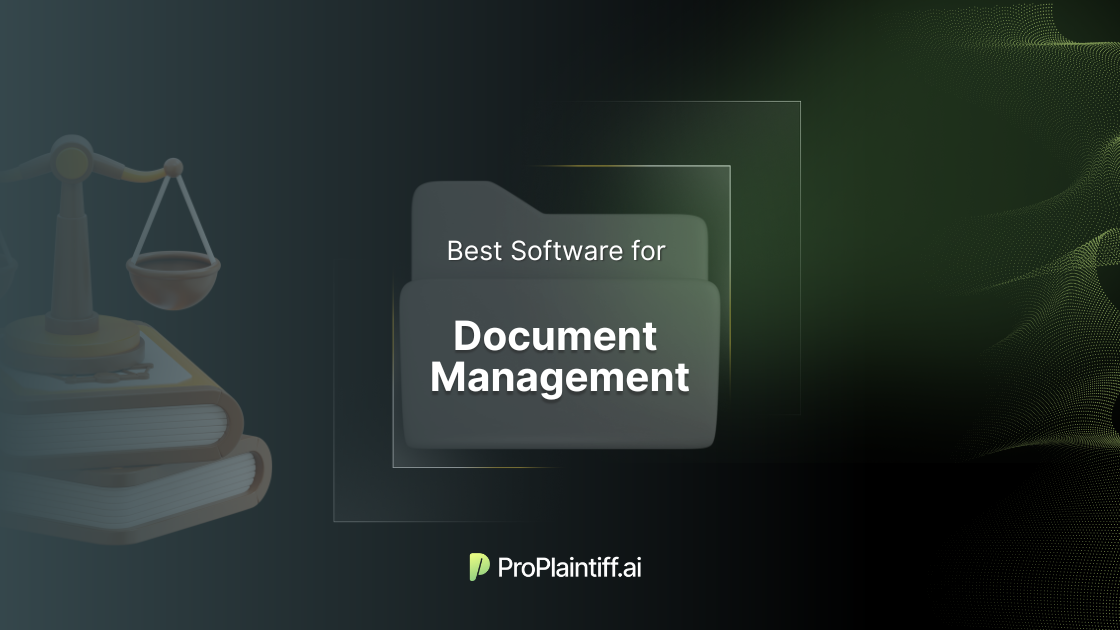
Personal injury law firms are buried in documents, from medical records and police reports to client communications and court filings. Managing this deluge efficiently is the difference between a streamlined practice and a chaotic one. A 2021 survey by the ABA Legal Technology Resource Center found that lawyers spend an average of 2.9 hours per day on non-billable administrative tasks, with document management being a significant contributor. Inefficient document handling leads to wasted hours, missed deadlines, and increased operational risk. The solution lies in adopting the right tools.
This guide cuts through the noise to present a curated list of the best software for document management, specifically tailored for the unique demands of personal injury law. We move beyond generic feature lists to provide a detailed analysis of each platform. Understanding the foundational aspects of a modern document management system is key to appreciating its non-negotiable role in firm streamlining, a concept we will explore through practical examples.
Inside, you will find a breakdown of leading options, complete with screenshots and direct links to each. We will cover:
Best for AI-Powered Workflow Automation in Personal Injury Law
ProPlaintiff.ai stands out as more than just a storage solution; it's an AI-powered operating system engineered specifically for the demanding document workflows of personal injury law firms. This platform provides one of the best software for document management solutions by integrating advanced AI directly into the document lifecycle, transforming how firms process case files from intake to settlement. It's designed to automate and accelerate the most time-consuming tasks, such as drafting detailed demand letters and creating precise medical chronologies.
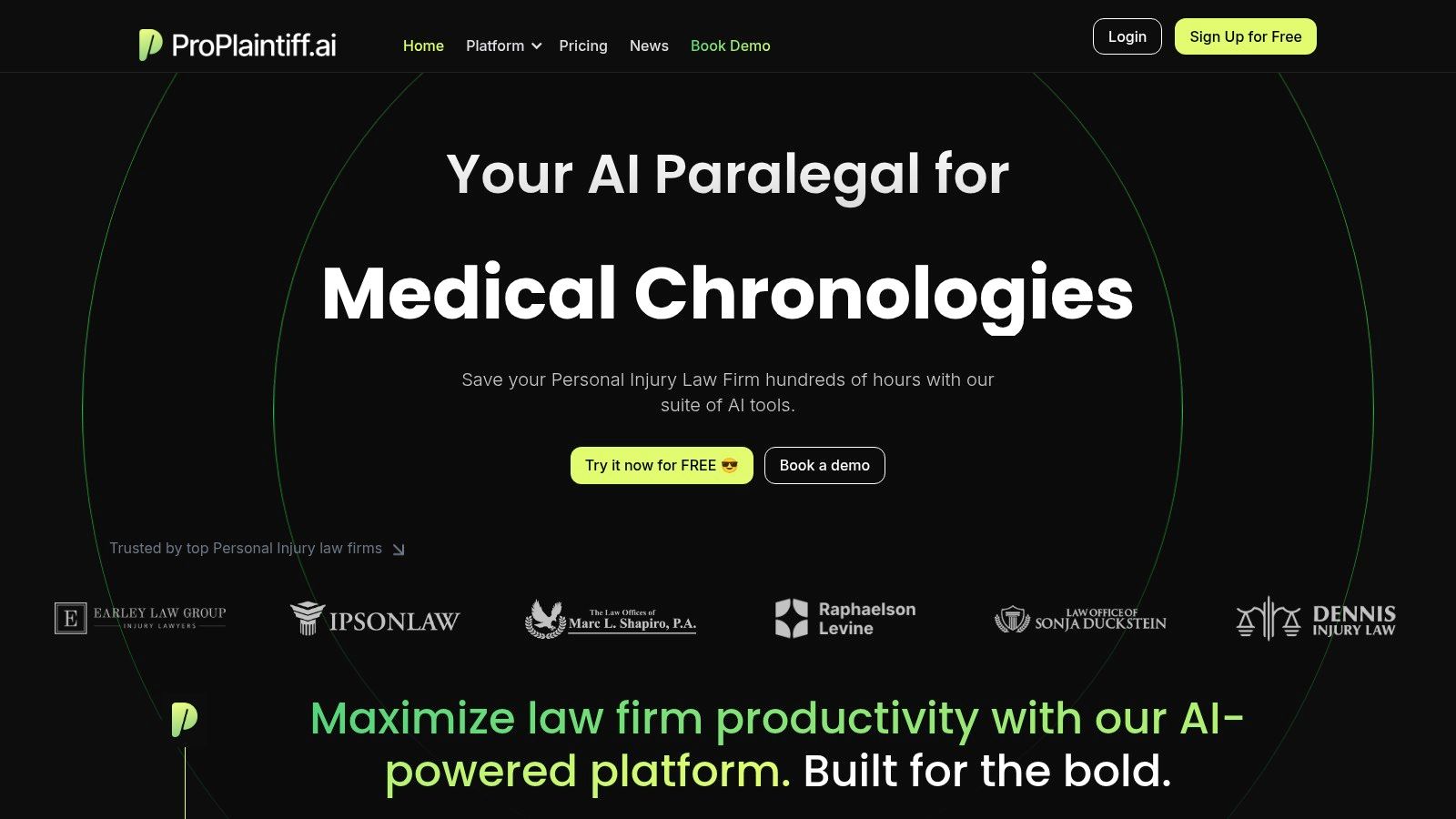
Unlike generic document management systems, ProPlaintiff.ai’s "AI Paralegal" can analyze thousands of pages of medical records, deposition transcripts, and police reports in minutes. For instance, a paralegal can upload 500 pages of medical records and, within minutes, the AI generates a complete, table-formatted medical chronology, saving an estimated 8-10 hours of manual work. This allows legal teams to generate comprehensive summaries or query specific documents using natural language, significantly cutting down on manual review time. Its ability to handle diverse media, including transcribing audio and video files, centralizes all case-related evidence into a single, searchable, and secure hub. The platform’s commitment to security is underscored by its HIPAA compliance and SOC 2 auditing, ensuring sensitive client data remains protected.
ProPlaintiff.ai offers flexible, scalable subscription plans suitable for solo practitioners and large firms. Pricing starts at $99/month for the Starter plan, which includes a set number of AI credits for document processing. Larger plans provide more credits and additional user seats. Implementation is straightforward, with a user-friendly interface designed for quick adoption. The platform offers a 7-day free trial, allowing firms to evaluate its impact risk-free. Given its specialized focus, it represents one of several top AI litigation tools revolutionizing legal practices today.
Significant Time Savings: AI automation drastically cuts time spent on demand letters and medical summaries.
Credit-Based Costs: High-volume firms may find credit costs a factor for extensive AI use.
PI-Specific Focus: Tailored features address the unique document challenges of personal injury law.
Learning Curve: Maximizing the advanced AI features may require a brief initial learning period.
Comprehensive Security: HIPAA and SOC 2 compliance provide robust protection for sensitive client data.
Advanced AI Capabilities: Interactive document querying and media analysis offer a competitive advantage.
Website: https://www.proplaintiff.ai
For law firms already operating within the Microsoft ecosystem, SharePoint is a natural and powerful choice for robust document management. It excels at creating secure, centralized repositories for case files, discovery documents, and internal firm records. Its strength lies in its deep integration with Microsoft 365 apps like Word, Excel, and Teams, allowing for seamless co-authoring and real-time collaboration on legal documents without leaving the platform.

SharePoint is more than just cloud storage; it's a comprehensive platform for building internal sites (intranets) for firm-wide communication and resource sharing. For personal injury firms, this means you can create a dedicated site for each major case, complete with document libraries, task lists, and calendars. For example, a paralegal can set up an automated alert that notifies the lead attorney whenever a new expert report is uploaded to a specific case library. Its advanced versioning and check-in/check-out features are critical for maintaining the integrity of evidence and draft pleadings, ensuring a clear audit trail. Furthermore, you can implement sophisticated security controls; for example, policies like Microsoft 365 Conditional Access can restrict document access based on user location or device compliance, adding a crucial layer of protection for sensitive client data.
Best For
Firms standardized on Microsoft 365 seeking deep integration and compliance.
Pros
Widely adopted, robust security, and flexible licensing options.
Cons
Initial setup and governance can be complex without dedicated IT expertise.
Pricing
Available standalone (starting from $5/user/month) or bundled in Microsoft 365 Business and Enterprise plans.
Visit Website
For firms prioritizing accessibility and real-time collaboration, Google Workspace presents a compelling and user-friendly alternative. Google Drive, its core component, serves as one of the best software for document management by offering a streamlined, cloud-native environment. It excels at collaborative drafting of demand letters or client communications using Google Docs, where multiple team members can comment and edit simultaneously, eliminating version control confusion common with email attachments.

Google Workspace's strength is its intuitive interface and powerful search, which uses the same technology as Google's web search to instantly find specific phrases within case files or discovery documents. For law firms, Shared Drives are essential, creating centralized, firm-owned folders for cases so that files remain with the firm even if an employee departs. Higher-tier plans add crucial legal-tech features like Google Vault for eDiscovery and data retention, which can be configured to meet legal hold requirements for specific case matters. A practical example is placing all documents in a specific case's Shared Drive under a legal hold, which prevents anyone from deleting files and ensures compliance with court orders. This simplicity and scalability make it a strong choice for modern, agile personal injury firms.
Best For
Agile firms and remote teams that value real-time collaboration and a simple user experience.
Pros
Highly intuitive interface, excellent search, and competitive pricing for small to mid-sized firms.
Cons
Advanced governance and security features require higher-tier plans; less ideal for firms heavily invested in Microsoft desktop software.
Pricing
Business plans start at $6/user/month, with advanced features like Vault included in Business Plus plans and higher.
Visit Website
Box is a leading cloud content management platform that positions itself as a secure, centralized hub for a firm's most critical documents. For personal injury firms dealing with sensitive client information, medical records, and evidence, Box provides enterprise-grade security and compliance features. Its strength lies in granular access controls and robust external sharing capabilities, allowing firms to collaborate securely with clients, co-counsel, and experts without compromising data integrity. It acts as a single source of truth for all case-related content.

Unlike general cloud storage, Box is built for business workflows and regulated industries. It offers features like Box Sign for e-signatures, automated document retention policies, and legal holds, which are essential for firm governance and eDiscovery readiness. A practical use case is creating a secure Box folder for an expert witness, granting them "uploader" access only, so they can submit their reports without being able to view other sensitive case files in the parent folder. A key differentiator is its extensive integration marketplace, connecting seamlessly with over 1,500 applications including Salesforce, Microsoft 365, and Google Workspace. This makes it a flexible core for a firm’s tech stack, serving as some of the best software for document management by unifying disparate systems into one secure content layer.
Best For
Firms prioritizing enterprise-grade security, compliance, and secure external collaboration.
Pros
Industry-leading security features, excellent admin controls, and vast integration options.
Cons
Higher-tier plans are required for advanced features like AI and workflow automation, making it costly.
Pricing
Business plans start at $15/user/month (billed annually) with a 3-user minimum.
Visit Website
Box Business Pricing
For law firms prioritizing simplicity, fast synchronization, and robust external file sharing, Dropbox Business is an excellent and user-friendly document management solution. Its core strength lies in its "set it and forget it" file sync, which ensures every team member has the latest version of a case file, deposition video, or expert report on their local machine and in the cloud. This reliability makes it one of the best software for document management when dealing with large volumes of evidence and multimedia files.
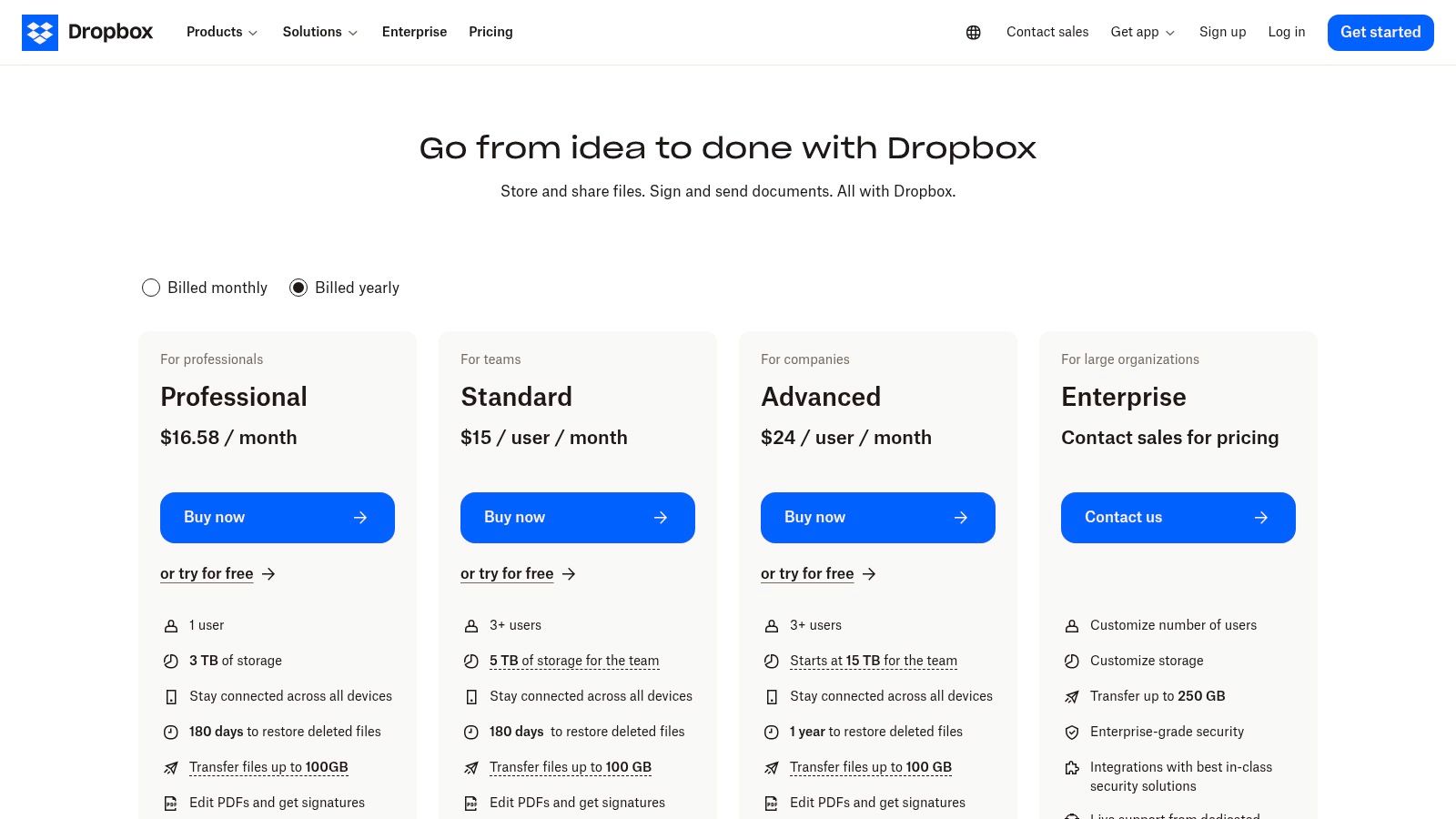
Beyond simple storage, Dropbox Business offers features tailored to legal workflows, including built-in PDF editing, document watermarking, and unlimited eSignature requests through Dropbox Sign. For a personal injury practice, this means you can securely send a settlement agreement to a client for their signature and receive the executed copy back without ever leaving the platform. For instance, a paralegal can use Dropbox Transfer to send a 50 GB folder of accident scene video footage to an expert witness with a password and an expiration date, ensuring secure, time-limited access. Its granular sharing permissions and file activity tracking provide a clear audit trail, allowing you to see exactly who accessed a sensitive medical record and when. The clear upgrade path from solo plans also makes it highly scalable for growing firms.
Best For
Firms needing superior file synchronization and easy external collaboration.
Pros
Strong synchronization performance, ease of use, and straightforward plans.
Cons
Governance features are lighter than dedicated ECM suites like SharePoint.
Pricing
Business plans start at $15/user/month for the Standard plan.
Visit Website
Egnyte positions itself as a security-first platform, making it an excellent choice for firms prioritizing governance and compliance alongside efficient collaboration. It offers a unique hybrid deployment model, allowing firms to store sensitive case files on-premises while leveraging the cloud for accessibility and collaboration on less critical documents. For example, a firm could use an on-premise server for long-term archival of closed case files to meet data sovereignty rules, while using Egnyte's cloud for active cases requiring team collaboration. This flexibility is a key differentiator, providing control over data without sacrificing modern workflows. Its deep integrations allow for co-editing within Microsoft 365 and Google Workspace, streamlining document creation and review cycles.

For a personal injury firm, Egnyte's strength is in its robust security and governance framework. Features like ransomware detection and advanced data loss prevention (DLP) provide active defense against cyber threats targeting sensitive client information. Furthermore, its AI-powered features on higher tiers, such as AI Search and AI Workflows, can significantly accelerate document retrieval and automate repetitive tasks. This platform is one of the best software for document management options for firms that handle large files like high-resolution photos or video evidence, as its architecture is optimized for performance in such scenarios.
Best For
Firms needing strong security, compliance, and hybrid cloud flexibility.
Pros
Strong compliance options, optimized for large files, and hybrid environments.
Cons
Advanced features are limited to expensive premium tiers; per-user pricing can be costly for large teams.
Pricing
Plans start at $20/user/month (billed annually). Enterprise and platform plans require a custom quote.
Visit Website
M-Files stands out by organizing documents based on what they are, not where they are stored. Its metadata-driven approach means users can find any document, whether it’s on a local server, in SharePoint, or in another repository, using context like case name, client, or document type. For personal injury firms, this eliminates the need to remember complex folder structures. For example, a paralegal could perform a search for "All Medical Invoices" related to "Case #12345" and instantly retrieve the files, regardless of whether they were stored in the client's email folder, the accounting folder, or a separate case file directory.

This platform is a strong contender for firms looking for the best software for document management combined with powerful workflow automation. You can configure rules to automatically route settlement offers for partner approval or trigger tasks when new discovery documents are added to a case file. With its flexible deployment options (cloud, on-premises, or hybrid), M-Files can adapt to a firm’s specific IT infrastructure and security requirements, providing a customized solution that grows with your practice.
Best For
Firms needing advanced search, process automation, and integration with existing systems.
Pros
Excellent search capabilities, powerful workflow automation, and flexible deployment models.
Cons
Pricing is quote-based, and initial setup requires thoughtful administrative design.
Pricing
Custom quote-based pricing.
Visit Website
DocuWare stands out as a sophisticated cloud document management system that pairs robust storage with powerful workflow automation, making it an excellent choice for mid-sized firms looking to streamline complex processes. It moves beyond simple file hosting by offering tools to digitize and automate document-centric workflows, such as client intake, medical record requests, and settlement approvals. Its intelligent indexing feature automatically reads key information from documents, reducing manual data entry and minimizing errors when filing critical case materials.
For a personal injury firm, this means you can build custom digital forms for new clients and create automated workflows that route documents for review and signature without manual intervention. A practical example would be scanning an incoming medical bill; DocuWare’s intelligent indexing can automatically identify the patient's name, date of service, and amount due, then use that data to file the document and create a task for the paralegal to review it. A key advantage is its granular licensing model, which allows firms to assign full-access licenses to attorneys and paralegals while providing more affordable workflow-only licenses to administrative staff. While the system's power requires a more involved setup, often with a certified partner, the result is a highly tailored solution.
Best For
Mid-market firms needing to automate document-heavy processes like client intake or discovery management.
Pros
Strong workflow and forms capabilities, and flexible licensing to manage costs for different user roles.
Cons
Pricing is not public and requires a sales consultation; implementation often requires certified partner support.
Pricing
Custom quote-based. Plans are scalable by user count and storage needs. A 30-day free trial is available.
Visit Website
Laserfiche is a powerful enterprise content management (ECM) platform that has evolved into one of the best software for document management, especially for firms requiring stringent compliance and automation. It goes beyond simple storage by providing sophisticated tools for managing the entire lifecycle of a legal document, from creation and capture to archival and destruction. For personal injury firms, this means building automated workflows for client intake, evidence processing, and settlement document approvals, significantly reducing manual administrative tasks.

The platform’s strength lies in its combination of business process automation, electronic forms, and robust records management. A firm could use Laserfiche Forms to create a secure online client intake questionnaire that, upon submission, automatically creates a new matter file, assigns tasks to a paralegal, and files the form in the correct client folder. Its detailed audit trails and legal hold capabilities are critical for eDiscovery and regulatory compliance, ensuring that sensitive case information is handled according to legal standards and cannot be prematurely deleted. Laserfiche’s growing AI features also help in extracting key data from unstructured documents like police reports or medical records, speeding up case analysis.
Best For
Firms needing advanced automation and strict, certified records management.
Pros
Strong compliance features, transparent pricing, powerful automation engine.
Cons
Higher user minimums on some plans; implementation often requires professional services.
Pricing
Cloud plans start from $60/user/month (annual billing) with various tiers available.
Visit Website
For small to mid-sized firms looking for an affordable yet powerful document management system, Zoho WorkDrive presents a compelling value proposition. It is designed around team collaboration, shifting the paradigm from individual user storage to centralized "Team Folders." This structure is ideal for personal injury firms that can create a dedicated Team Folder for each case, ensuring all related documents, from client intake forms to medical records and evidence files, are stored in one accessible, permission-controlled location.
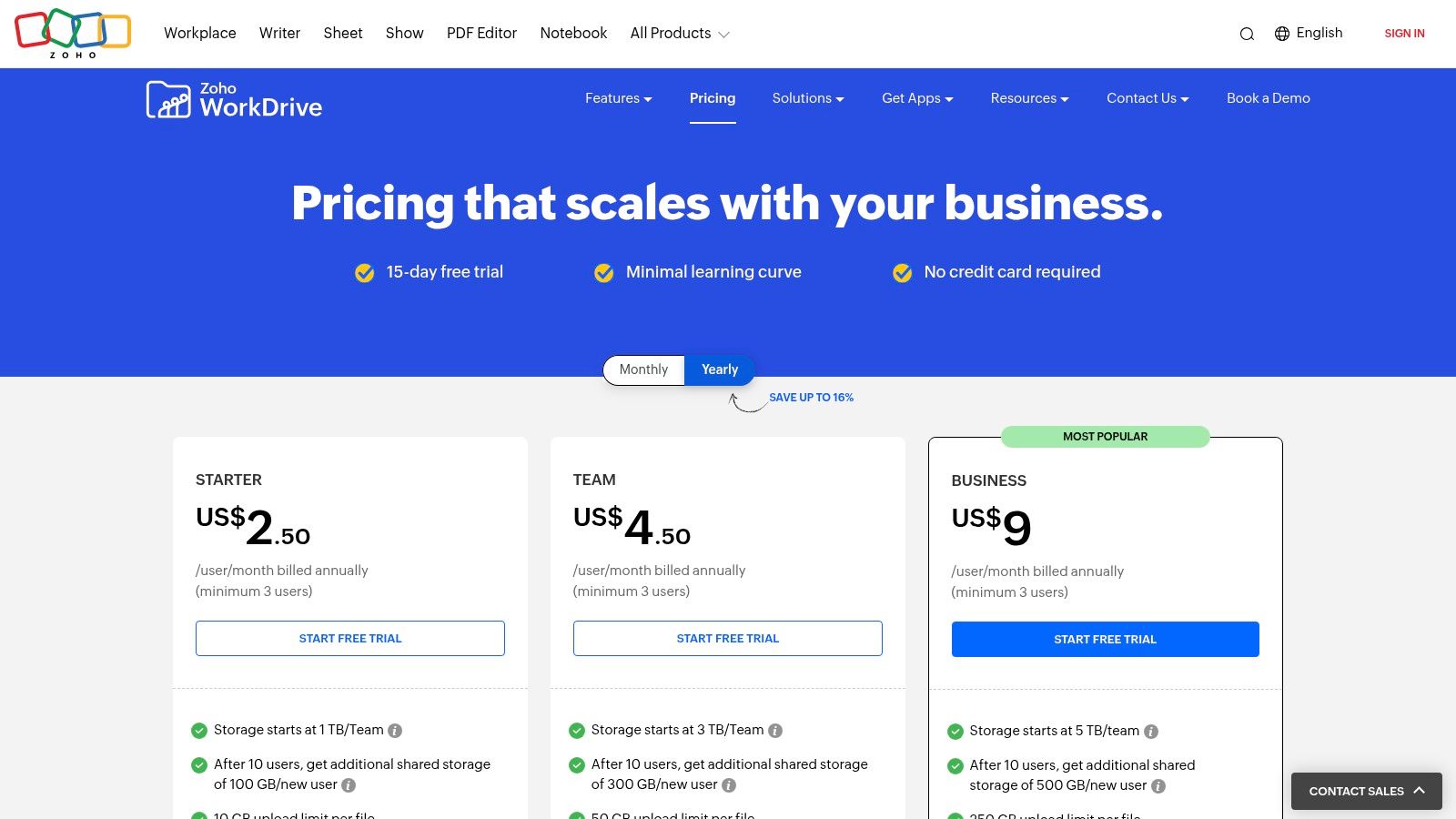
Zoho WorkDrive's strength lies in its tight integration with the broader Zoho ecosystem, including Zoho CRM and Zoho Projects. For a firm already using Zoho CRM for client management, this integration creates a seamless experience. For example, a case file folder in WorkDrive can be directly linked to the client's record in the CRM, allowing anyone viewing the client's profile to access all associated documents with a single click. The platform offers unlimited version history, preventing accidental overwrites of critical documents like demand letters. Advanced search capabilities and granular access controls ensure that paralegals can find what they need quickly while sensitive financial or strategy documents remain restricted to partners, making it a top contender for the best software for document management for growing firms.
Best For
Growing firms and those already invested in the Zoho ecosystem.
Pros
Competitive pricing, generous pooled storage, and strong team-based model.
Cons
Compliance and eDiscovery features are less robust than enterprise-focused platforms.
Pricing
Starts at $2.50/user/month for the Business plan (billed annually).
Visit Website
For law firms with an established AWS cloud infrastructure or in-house IT expertise, the AWS Marketplace offers a different approach to sourcing the best software for document management. Instead of a single product, it's a digital catalog where firms can find, test, and deploy a wide array of document management systems (DMS) and intelligent document processing (IDP) solutions directly within their secure AWS environment. This allows for unparalleled flexibility in choosing a tool that fits a firm's specific technical and operational needs.
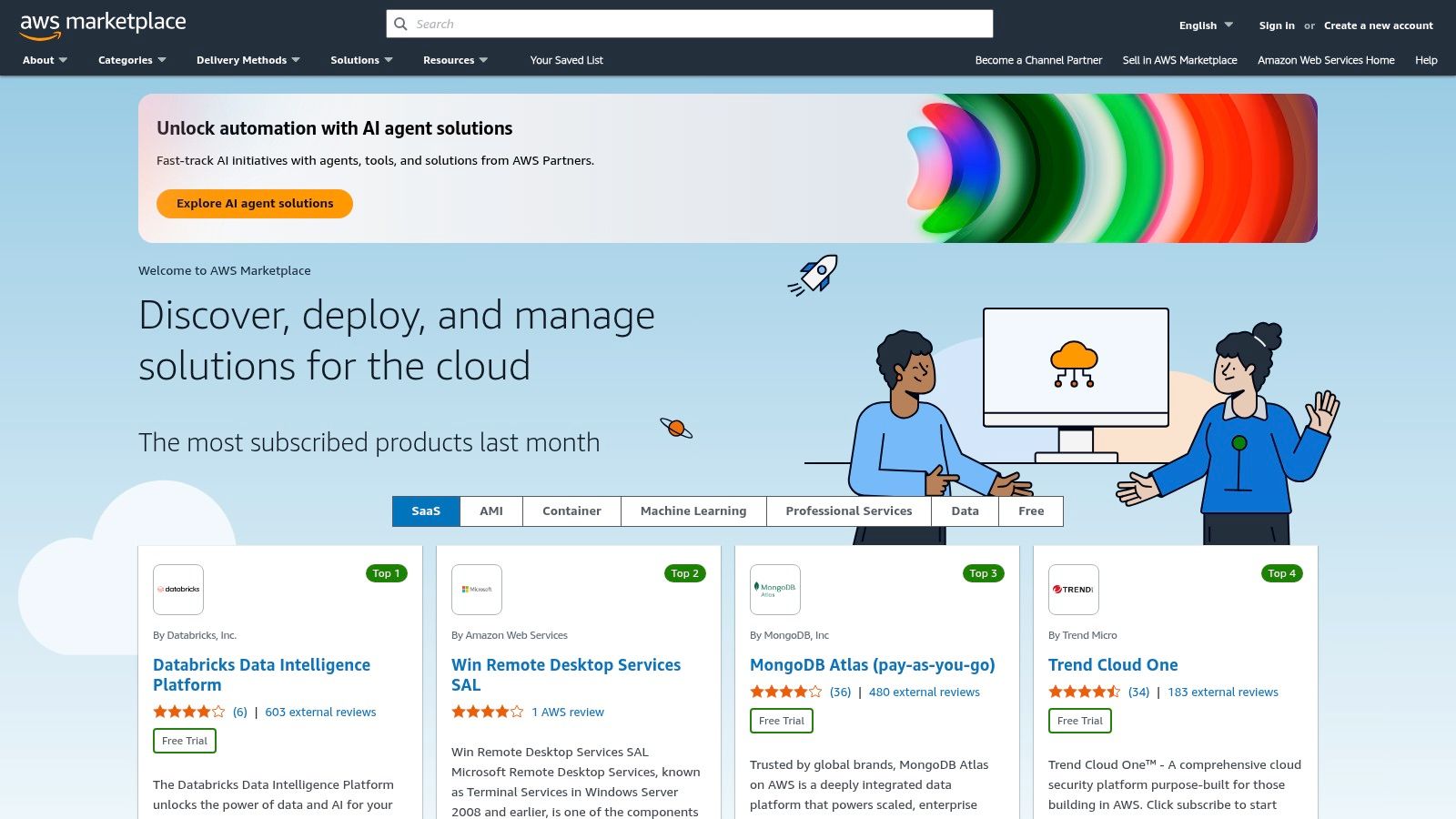
The primary advantage is the ability to rapidly deploy and evaluate various options, from commercial systems like LogicalDOC to open-source alternatives like OpenKM, without lengthy procurement cycles. A firm could, for instance, spin up a trial version of an IDP solution to test its accuracy in extracting data from medical records before committing. For example, a firm's IT admin could launch a pre-configured server image for an open-source DMS in under an hour to evaluate its features for a small internal pilot project. Billing is consolidated through the existing AWS account, simplifying vendor management. This procurement model puts control firmly in the hands of the firm’s IT team, enabling them to maintain governance over data residency and security within their own cloud.
Best For
Tech-savvy firms with existing AWS infrastructure looking to test and deploy a variety of DMS solutions.
Pros
Easy spin-ups for trials, consolidated AWS billing, and a wide variety of software options.
Cons
Quality varies by vendor, and comparing the different, often complex pricing models can be challenging.
Pricing
Varies significantly by vendor; includes pay-as-you-go, subscription, and bring-your-own-license (BYOL) models.
Visit Website
While not a document management system itself, G2’s dedicated category is an invaluable starting point for any law firm evaluating its options. It acts as a comprehensive aggregator of peer-based reviews, allowing you to filter and compare the market's best software for document management based on real-world user satisfaction. For a busy personal injury firm, this platform provides a crucial shortcut to creating a shortlist of viable vendors that fit specific needs, such as firm size or integration requirements.
The platform's strength lies in its user-generated content and detailed comparison grids. For example, a firm administrator can filter results to show only DMS solutions that integrate with their specific case management software and then sort those options by the highest user satisfaction rating from other small law firms. This data-driven approach helps firms move beyond marketing claims and focus on how a platform performs in practice. Using the filters to narrow options by "small business" or "mid-market" can help you identify solutions that are priced and scaled appropriately for your practice, preventing wasted time on demos for software that is a poor fit.
Best For
Firms in the initial research phase needing to compare multiple vendors.
Pros
Broad market coverage, up-to-date user insights, and helpful filtering tools.
Cons
Sponsored placements can appear first, and some reviews may be outdated.
Pricing
Free to browse and use for software buyers.
Visit Website
G2 Document Management Category
Navigating the crowded market to find the best software for document management can feel overwhelming, but it's a foundational decision that will shape your firm's efficiency, security, and scalability for years to come. This guide has dissected a range of powerful tools, from general-purpose cloud storage like Google Workspace and Dropbox Business to highly specialized, compliance-focused platforms such as M-Files and Egnyte. Each offers a distinct value proposition, and the right choice is rarely a one-size-fits-all answer.
Your selection process should be a strategic exercise, not just a feature comparison. The ideal document management system (DMS) is one that integrates seamlessly into your existing workflows, empowers your team rather than encumbering them, and provides a clear return on investment.
As you move forward, keep these core principles at the forefront of your decision-making process:
With this information in hand, your path forward should be clear and methodical. Don't rush into a long-term contract. Instead, create a shortlist of two or three top contenders that align with your firm’s specific profile and challenges.
Choosing the best software for document management is more than an IT upgrade; it's an investment in your firm's operational backbone. By carefully aligning a platform’s capabilities with your unique needs, you can transform document chaos into a streamlined, secure, and highly competitive asset.
Ready to see how a specialized AI-powered DMS can revolutionize your personal injury practice? ProPlaintiff.ai goes beyond simple storage, using advanced AI to automate the creation of demand letters, medical chronologies, and case summaries directly from your case files. Discover how to reclaim hundreds of hours and maximize case values by visiting ProPlaintiff.ai to schedule a personalized demo today.